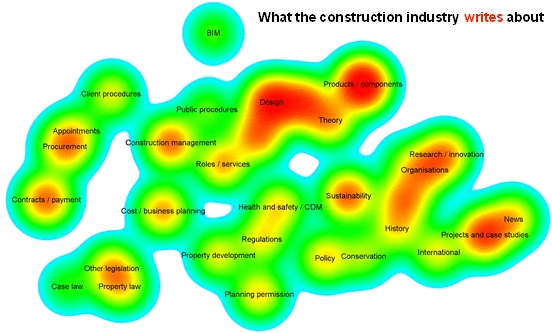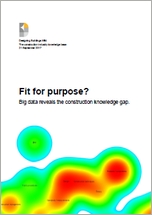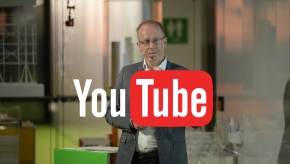Fit for purpose - Big data reveals the construction knowledge gap
See also: Construction knowledge gap meeting and Knowledge gap survey responses.
Big data exposes a widening construction knowledge gap
Analysis of 6 million pieces of data has revealed that the knowledge framework underpinning the construction industry is no longer fit for purpose. Practitioners do not have easy access to critical knowledge, and so it is inevitable that mistakes will be made.
Designing Buildings Wiki, the construction industry knowledge base, has undertaken the first ever comprehensive mapping of construction industry knowledge. The startling results have been published today (21 September 2017) in a major new report ‘Fit for purpose? Big data reveals the construction knowledge gap’.
The report includes a series of remarkable visual maps giving never-before-seen insights into how construction knowledge works and where it fails.
The key findings of the report are:
- The industry is lacking the strategic leadership needed to coordinate the creation and dissemination of knowledge.
- The emergence of the internet has fundamentally changed the way practitioners access knowledge, but the industry has not kept up.
- Knowledge that is difficult to understand, buried in long documents or locked behind pay walls will not be used - even if it is critically important.
- Practitioners need accessible, practical, easy-to-use guidance to help them carry out everyday activities.
In the wake of the Edinburgh schools defects and the fallout from the Grenfell Tower tragedy, the report suggests the industry needs to get organised and stop leaving the dissemination of knowledge to chance - or more mistakes will be made.
Designing Buildings Wiki chairman, David Trench CBE FCIOB said:
“A lot of construction knowledge published at the moment is niche research aimed at making the top performing 1% of the industry better. But it is leaving the other 99% to fend for themselves. It is well established that construction performance in the UK lags behind other industries and other countries, this report gives some clues about why this is and what could be done to turn things around.”
Mark Farmer, CEO of Cast Consultancy and author of ‘Modernise or Die’ said:
“The concept of open data networks and the increasing democratisation of data and knowledge were concepts I explicitly referenced in my recent review of the construction industry ‘Modernise or Die’. The findings of this report reaffirm that current knowledge and innovation is not being captured in a way that is broadly and strategically accessible to enable industry at large to benefit. Knowledge & data ‘silos’ are a feature of our industry and we clearly need to break these open through more collaborative forums and platforms that have greater reach into the mainstream of our industry.
“The assertion that much academic work is not influencing industry’s improvement is one that I identify with and we need a step up in the vetting of what research is commissioned that has sufficient applied value for the wider industry rather than specialist interest groups that does not necessarily make it relevant or scalable.”
Andrew Morris, Senior Partner at Rogers Stirk Harbour and Partners said:
“The likely impact of Brexit on the construction industry means it is vitally important to encourage the continued sharing of information and ideas, and ensure there are coordinated programmes of education and research. This timely report offers a number of strategic recommendations that can steer knowledge creation and promote the dissemination of knowledge to help the industry maintain its performance and improve its openness through a period of unprecedented change.”
Julia Evans, BSRIA CEO, said:
“The way information is accessed is changing so the way we disseminate information will need to change. Disseminating information is only part of the story, original authoritative content needs to be produced to ensure the industry continues to develop and deliver the sustainable buildings required now and in the future. There is a need to add value to information including primary research by providing the ‘what does it mean to me?’ angle.
“It is especially interesting to see the report suggests tackling the construction industry as a whole, rather than piecemeal, with strategic leadership to ensure that duplication of effort is avoided and gaps are plugged.”
Nathan Baker, ICE's Director of Engineering Knowledge, said:
“Digital transformation is affecting every part of construction and it is important that the institutions work with industry and government to ensure that we adapt. Knowledge sharing and collaboration in particular will be vital in overcoming the challenges confronting the industry. This report provides fascinating insights to help steer our collective response to the new risks and opportunities we face, ensuring people at all points in their career have access to the right knowledge.”
Click here to download the report.
Notes
About Designing Buildings Wiki:
Designing Buildings Wiki is the construction industry knowledge base. It was created in 2012 by architect Dr Gregor Harvie and project manager David Trench CBE FCIOB to make cross-discipline construction knowledge available to everyone for free. It now includes more than 5,000 articles and is used by 3.5 million people a year, making it one of the most popular construction industry websites.
Designing Buildings Wiki is supported by; The Institution of Civil Engineers, Rogers Stirk Harbour + Partners, The Chartered Institute of Building, The Institute of Historic Buildings Conservation, U and I Group PLC, BRE Trust, BSRIA and The Chartered Institute of Architectural Technologists.
About the launch:
The report will be launched on 21 September at the offices of Rogers Stirk Harbour and Partners in The Leadenhall Building. The event will include an introduction by Mark Farmer, author of ‘Modernise or Die’ which suggested the industry faces ‘inexorable decline’ unless longstanding problems are addressed. In particular, it highlighted the sector’s dysfunctional training model, its lack of innovation and collaboration, and its non-existent research and development (R&D) culture.
Click here to download the report.
Click here to read a report from the launch event.
Featured articles and news
The challenge as PFI agreements come to an end
How construction deals with inherit assets built under long-term contracts.
Skills plan for engineering and building services
Comprehensive industry report highlights persistent skills challenges across the sector.
Choosing the right design team for a D&B Contract
An architect explains the nature and needs of working within this common procurement route.
Statement from the Interim Chief Construction Advisor
Thouria Istephan; Architect and inquiry panel member outlines ongoing work, priorities and next steps.
The 2025 draft NPPF in brief with indicative responses
Local verses National and suitable verses sustainable: Consultation open for just over one week.
Increased vigilance on VAT Domestic Reverse Charge
HMRC bearing down with increasing force on construction consultant says.
Call for greater recognition of professional standards
Chartered bodies representing more than 1.5 million individuals have written to the UK Government.
Cutting carbon, cost and risk in estate management
Lessons from Cardiff Met’s “Halve the Half” initiative.
Inspiring the next generation to fulfil an electrified future
Technical Manager at ECA on the importance of engagement between industry and education.
Repairing historic stone and slate roofs
The need for a code of practice and technical advice note.
Environmental compliance; a checklist for 2026
Legislative changes, policy shifts, phased rollouts, and compliance updates to be aware of.
UKCW London to tackle sector’s most pressing issues
AI and skills development, ecology and the environment, policy and planning and more.
Managing building safety risks
Across an existing residential portfolio; a client's perspective.
ECA support for Gate Safe’s Safe School Gates Campaign.
Core construction skills explained
Preparing for a career in construction.
Retrofitting for resilience with the Leicester Resilience Hub
Community-serving facilities, enhanced as support and essential services for climate-related disruptions.

























Comments
I think this research is excellent, as somebody currently undertaking preparations for the Part 3 exam, documentation is expensive as are books and other pieces of vital knowledge required. If the industry wants well qualified competent individuals it is necessary for this to end. Plus the research is comprehensive and complied into 19 pages, the perfect lunch time reading length